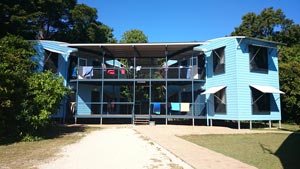With the Great Barrier Reef on its doorstep, the Orpheus Island Research Station is a haven for researchers studying corals, fish behaviour, marine life, coral spawning, climate change and for tagging and tracking sharks.
Hosting approximately 1,200 researchers each year, the James Cook University (JCU) research station on Orpheus Island is ideally located for marine biologists and students studying the Great Barrier Reef.
[headline size=”small” align=”left”]research[/headline]
 Most researchers that visit Orpheus Island can conduct their studies anytime throughout the year, but coral spawning generally happens between October to December, with November being their busiest month for spawning.
Most researchers that visit Orpheus Island can conduct their studies anytime throughout the year, but coral spawning generally happens between October to December, with November being their busiest month for spawning.
Other research undertaken at the island includes the study of coral and marine life, better understanding of fish behaviours, climate change and tagging and tracking sharks.
While most of the students conduct marine-based research the Station occasionally hosts researchers conducting land-based studies. Very little is known about the plants and animals on the island so students are also welcome to study the flora and fauna on the island itself.
[headline size=”small” align=”left”]visitors[/headline]
 Orpheus Island Research Station mainly caters for JCU students (in Townsville and Cairns), but it also hosts students from St Andrews University in the UK as well as local high school students.
Orpheus Island Research Station mainly caters for JCU students (in Townsville and Cairns), but it also hosts students from St Andrews University in the UK as well as local high school students.
Students can stay anywhere from four days up to two months depending on what they are studying and the kind of research they are doing.
While Orpheus Island Research Station is not a tourist attraction there is also an opportunity for non-researchers to visit.
If you want to get a bit of an insight into the marine research being undertaken on the Great Barrier Reef, the Station accepts volunteers to help with general maintenance. Last year 80 volunteers gave up their time to spend a few days helping out, in exchange for free accommodation and ferry transfers to and from the island.
 Since volunteers are only required to work four hours a day, it leaves plenty of time for exploring and snorkelling on the beach in front of the research station in Pioneer Bay.
Since volunteers are only required to work four hours a day, it leaves plenty of time for exploring and snorkelling on the beach in front of the research station in Pioneer Bay.
It’s a great opportunity to enjoy this beautiful island and learn more about what researchers are discovering about the Great Barrier Reef and the world’s marine environments.
[headline size=”small” align=”left”]facilities[/headline]
 The station can sleep up to 58 people in dormitory-style accommodation. It has two small kitchens and one large commercial-style kitchen, although students need to bring their own food.
The station can sleep up to 58 people in dormitory-style accommodation. It has two small kitchens and one large commercial-style kitchen, although students need to bring their own food.
As the research station caters for a variety of research projects, it has a wet lab (with filtered and unfiltered water), a dry lab, a microscope room, a temperature control room (TCR) which has heated and chilled tanks and is mainly used for research on coral spawning and climate change, a small library, lecture theatre, computer area, merchandising and a dive shed with tanks ready to use.
There is also a large touch tank on the beachfront, which is an actual living reef and an exact replica of the Great Barrier Reef in Pioneer Bay (just off the island). It has a reef crust, a slope, shallow and deep water and it gives students a taste of what they will see when they head out to the reef.
Assistant Manager at Orpheus Island Research Station, Marta Espinheira, says that as most researchers need to snorkel or dive to observe, study and carry out their research, they all need to be dive registered with JCU and have all their accreditations. And nobody is allowed to snorkel or dive after 6pm for safety reasons.
[headline size=”small” align=”left”]living on the island[/headline]
 The Station is managed by four full time staff. Marta lives in Western Australia but works four weeks on and two weeks off. She says it is always hard to leave the island.
The Station is managed by four full time staff. Marta lives in Western Australia but works four weeks on and two weeks off. She says it is always hard to leave the island.
“It is such a beautiful and incredibly amazing place to wake up every day that I always find it impossible to leave,” she says. Her role is basically to make life easier for the researchers by taking care of the logistics, organising ferry transfers and accommodation and lab use.
She explains that researchers put in 110 percent and it can be very stressful, competitive and exhausting work so her job is an important one.

